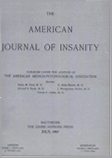THE "IMPRISONMENT PSYCHOSIS" WITH REPORT OF CASES
Abstract
1. The symptom-complex under discussion cannot be regarded as a disease entity.
2. It develops most often in the adolescent or young criminal.
3. While it may complicate other psychoses it very often occurs simply upon a markedly defective basis, which in some cases amounts to imbecility.
4. It is not infrequently associated with evidences of an attempt at simulation.
5. While related to hysteria in nature it can hardly be regarded as a hysterical psychosis, though of psychogenic origin.
6. Great apprehensiveness with partial stupor, hallucinations of sight and hearing, and often mutism are frequently the most prominent symptoms. Their rapid disappearance upon transfer to a hospital for insane is usual and striking.
Access content
To read the fulltext, please use one of the options below to sign in or purchase access.- Personal login
- Institutional Login
- Sign in via OpenAthens
- Register for access
-
Please login/register if you wish to pair your device and check access availability.
Not a subscriber?
PsychiatryOnline subscription options offer access to the DSM-5 library, books, journals, CME, and patient resources. This all-in-one virtual library provides psychiatrists and mental health professionals with key resources for diagnosis, treatment, research, and professional development.
Need more help? PsychiatryOnline Customer Service may be reached by emailing [email protected] or by calling 800-368-5777 (in the U.S.) or 703-907-7322 (outside the U.S.).



